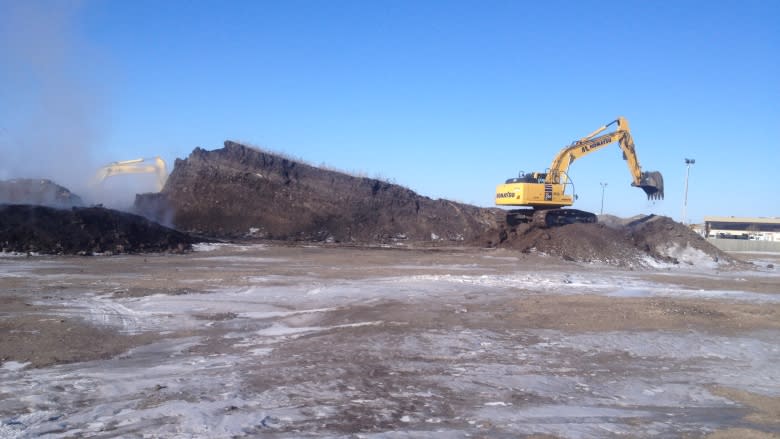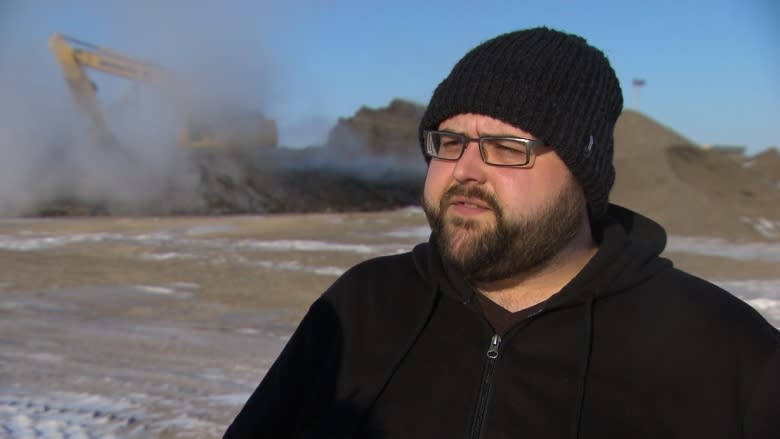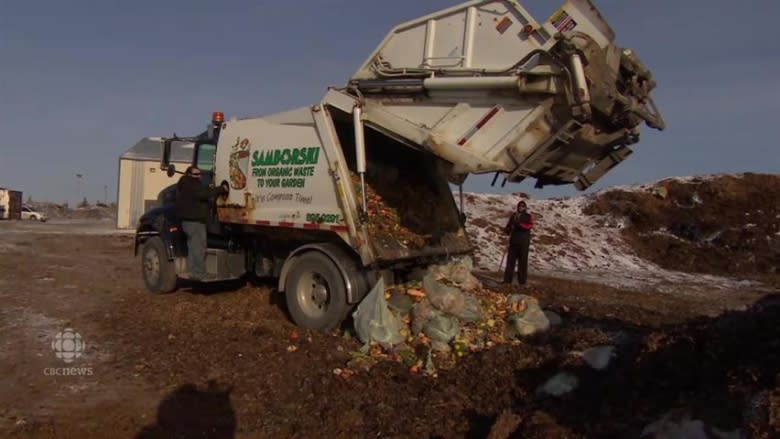Samborski claims theft as Manitoba takes over compost site cleanup
The Manitoba government has taken over the cleanup of compost material from Samborski Environmental Ltd.'s facility just outside Winnipeg, in a move that the company calls "theft."
"They're taking our property. They're taking our livelihood, they're taking our blood, sweat and tears," said Paul Samborski, the company's general manager.
Manitoba Conservation and Water Stewardship announced Tuesday that it has taken over the cleanup as part of an environmental protection order it slapped on Samborski last year.
"The order stated that if Samborski Environmental did not remove the compost material to another pre-approved or properly licensed location, the province could take over the job and recover costs from Samborski Environmental," the province said in a news release.
"The company failed to demonstrate satisfactory progress in the removal of compost from the site and a provincially hired contractor took over the job today."
At least two excavators were seen digging through piles of compost, which give off an intense smell, the CBC's Chris Glover reported from the Samborski site at noon.
Samborski told CBC News that his company has complied with the order and the government is now "taking all market ready compost" away from the site.
"This is theft, cut and dry theft," Samborski said in an email Tuesday morning.
The government and Samborski Environmental have been in a long-running dispute over the composting facility on McGillivray Boulevard, just southwest of Winnipeg in the Rural Municipality of Macdonald.
Don Labossiere, director of environmental compliance and enforcement with Manitoba Conservation, said what the government is doing with Samborski's materials is legal.
"We are enforcing an environmental protection order, a legally binding regulatory mechanism, so there is no theft here," said Labossiere.
"The order applies to all compost, or material intended for compost, or material in the process of being composted, and again compost shouldn't smell like it does today."
Samborski admitted the company's materials smell.
"Compost by nature, there's going to be an odour," said Samborski.
The province says it has received more than 500 complaints from residents and nearby residents since 2009 about "excessive odour" coming from the compost site.
Manitoba Conservation and Water Stewardship officials determined that the smells were coming from the Samborski facility and are a pollutant under the Environment Act.
Across town in St. Boniface, Loveday Mushroom Farms Ltd. emits odours that have resulted in complaints.
But by contrast, the province maintains unlike Samborski Environmental, Loveday is licensed, cooperative and receives about 15 per cent fewer complaints from members of the public.
"They've (Loveday) been taking that effort to try and deal with the situation, that can't be said in this circumstance," said Labossiere.
First ordered to clean up in 2013
The province issued its first environmental protection order in 2013, which Samborski then appealed. But in October of 2014, a court decided the province’s order was appropriate and a new protection order date was set for Dec. 1.
Department staff executed a search warrant at the Samborski facility on Jan. 14. At that time, Samborski accused the government of "bullying" the company.
The company, which has been in a zoning battle with the RM of Macdonald for about a decade, has maintained that its land is licensed for composting and the operation is properly managed.
Samborski said the company was in court on Jan. 28 to appeal a ruling from April 2014 that said the RM had the right to remove a caveat from a development agreement that allowed the Samborski land to be used for composting.
As a result, the Samborski property was not zoned for composting.
The company argued that the rural municipality acted in bad faith and said the caveat must stay with the development agreement for all time. A decision on the appeal has not yet been released.
"We are very confident we are going to win, but they are trying to put us out of business before a decision can be reached," Samborski said.
The province has said Samborski Environmental could be charged up to $500,000 for the cleanup efforts.




